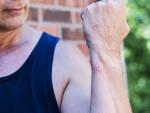
Psoriasis is an autoimmune disease, meaning your immune system reacts to healthy cells in your body as if they were a threat. In the case of psoriasis, this reaction leads to the overproduction of skin cells, which pile up into thick, red patches of skin called plaques. It’s not contagious—it’s genetic, so you can only get psoriasis if you inherited certain genes from your parents.
Think of your genes as switches on a control panel. Just because you have some switches marked ‘psoriasis’ doesn't mean they're always turned on—if you have psoriasis, you won’t have plaques at all times. The psoriasis switches turn on when factors in your environment trigger them. By regulating your environment and getting the right treatment, you can keep those big red switches in the off position and keep your psoriasis symptoms under control.
Environmental triggers for psoriasis include smoking, stress, infections, cuts, and burns. Avoiding these triggers can prevent your psoriasis from flaring up. But if you’re obese, your excess weight can also be a trigger, and your doctor will likely add weight loss to your prevention plan.
Obesity to Psoriasis
There’s a significant connection between obesity and psoriasis. People with obesity have a higher risk of developing psoriasis. And obese people with psoriasis also tend to have more severe cases of the skin disease.
Why might this be the case? One explanation involves your body mass index (BMI) and your immune system. Your doctor will diagnose obesity by measuring your BMI. This index considers your height and weight to determine where you fall between underweight and obese, with obesity defined by a BMI score of 30 or higher.. For people with obesity, carrying around extra weight puts stress on the immune system, and since psoriasis is an autoimmune disease, a weakened immune system will make you vulnerable to flare-ups.
Psoriasis to Obesity
Obesity may increase your risk of psoriasis, but some experts believe psoriasis may also increase your risk of obesity. In one study, researchers asked people to recall their weight at three points: before their psoriasis developed, when it developed, and at the time of the study. What they found was most people only started struggling with obesity after their psoriasis had emerged, not before. But of those involved, 93% were white non-Hispanic. We still don’t know if this trend holds true for other races.
Still, there’s little doubt that psoriasis can take a toll on your mental and social well-being. Poor body image and self-esteem due to psoriasis can lead to poor lifestyle choices. In turn, an inactive lifestyle and an unbalanced diet could put you on a path to weight gain. You should keep in mind that the connection between psoriasis and obesity probably goes in both directions.
Your Treatment Plan
Ready for some good news? There are many options for treating psoriasis directly. Ask your doctor to assess the severity of your condition. Then you can discuss topical treatments or light therapy, which works to suppress your immune system through exposure to ultraviolet rays. In severe cases, your doctor may recommend stronger biologic medication designed to target your immune system and halt the specific reaction behind your psoriasis. If you’re obese, it’s important to commit to a psoriasis treatment plan that includes weight loss goals, as obesity can increase your risk of experiencing side effects from your medication, and it can also make your medication less effective.
You can be in control of your psoriasis with the right treatment and a healthy lifestyle. And if you’re obese, adjust your diet and activity levels to start losing weight, because if you really want to cut down on psoriasis flare ups, shutting down obesity is an excellent place to start.










